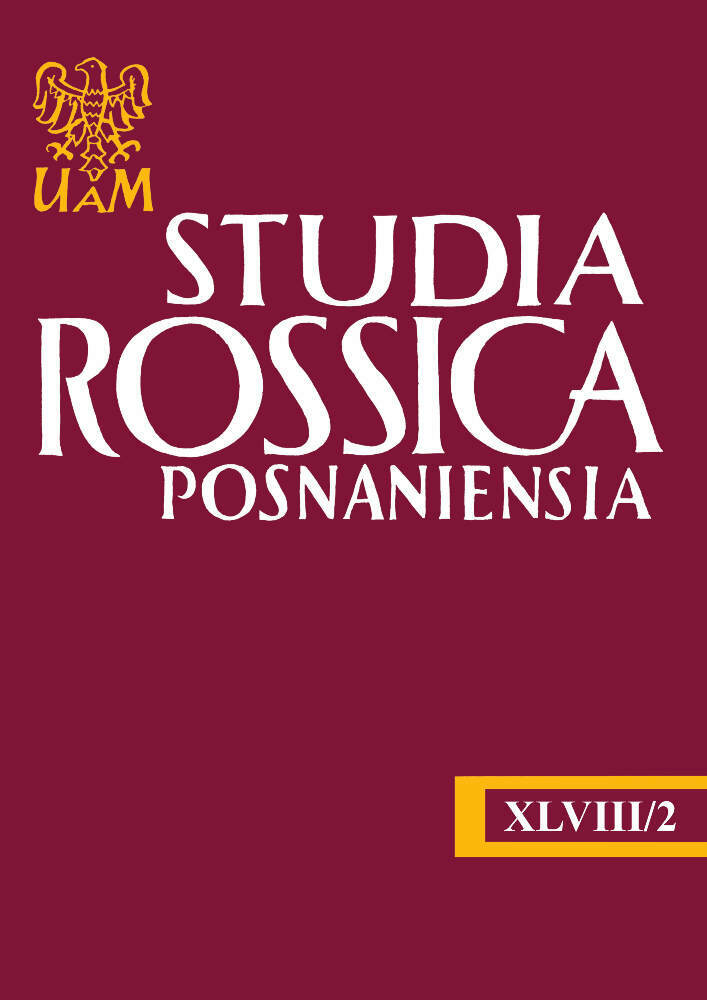Abstrakt
The aim of this paper is to present the literary theme of hope in the works of the Soviet Russian rock poet Igor Talkov (1956–1991). The poet’s poems as well as fragments of texts from the author’s prose serve as examples. In the course of analyzing the literary legacy of the composer, the author of the article distinguishes the following images of hope: the theme of hope conditioned by striving to fulfil his role in a dignified way in the arena of life; the theme of hope for the immortality of the poet’s fame and poetry; an inverted image of hope, interpreted as a loss of delusions; the theme of hope leading to victory in the unequal struggle of two ambivalent forces: Good and Evil; the theme of hope which is faith in a better life. Moreover, the conducted research shows that the poet, recalling the literary image of hope in his work, repeatedly referred to biblical texts and the works of the authors of the Golden Age, which, as works by Igor Talkov, allows to distinguish another characteristic feature of the presented speech master.
Bibliografia
Ancerowicz, Aleksandra. Obraz Rosji w twórczości Igora Talkova. Kutno, Wydawnictwo WSGK, 2021.
Anisimow, Jewgienij. Historia Rosji. Od Ruryka do Putina. Ludzie, daty, wydarzenia. Warszawa, Inicjał, 2017.
Bloom, Harold. The anxiety of influence: A theory of poetry. London, Oxford University Press, 1997.
Borowy, Wacław. O wpływach i zależnościach w literaturze. Kraków, Krakowska Spółka Wydawnicza, 1921.
Burzyńska, Anna, Michał Markowski. Teorie literatury XX wieku. Podręcznik. Kraków, Znak, 2006.
Hodanov, Mihail. „Spasite naši duši!…”. Kniga pervaâ. Pravoslavnaâ duhovnostʹ i tvorčestvo russkih poètov XX veka: Vladimir Vysockij, Igorʹ Talʹkov i drugie. Moskva, Otčij dom, 2000.
Horacy. Exegi monumentum aere perennius. Przeł. Adam Ważyk. Web. 11.10.2021. https://poezja.org/wz/Horacy/27881/Pie%C5%9B%C5%84_III_30_Wybudowa%C5%82em_pomnik_trwalszy_ni%C5%BC_ze_spi%C5%BCu.
Izmajlova, Irina. Tajna Igorâ Talʹkova. „Na rasterzanie vandalam”. Moskva, Âuza, 2011.
Kopaliński, Władysław. Słownik symboli. Warszawa, Rytm, 2019.
Księgi Zachariasza. Pismo Święte Starego i Nowego Testamentu. Przeł. Kazimierz Romaniuk. Kielce, Wydawnictwo M, 2013.
Lermontov, Mihail. Parus. Web. 11.10.2021. https://www.culture.ru/poems/36610/parus-beleetparus-odinokii.
Mucha, Bogusław. Historia literatury rosyjskiej. Warszawa, Zakład Narodowy im. Ossolińskich, 1989.
Ničiporov, Ilʹâ. „Motivy pesennoj poèzii Igorâ Talʹkova”. Literaturnaâ učeba, 1, 2003, s. 134–149.
Puškin, Aleksandr. Poèt. Web. 11.10.2021. https://rustih.ru/aleksandr-pushkin-poet/.
Puškin, Aleksandr. Poèt i tolpa. Web. 11.10.2021. https://www.culture.ru/poems/4432/poet-i-tolpa.
Puškin, Aleksandr. Poètu. Web. 11.10.2021. https://pishi-stihi.ru/poetu-pushkin.html.
Talʹkov, Igorʹ. Monolog. Stihi. Vospominaniâ. Dnevniki. Moskva, ÈKSMO-Press, 2002.
Talʹkov, Igorʹ. Sud. Web. 17.10.2021. https://www.youtube.com/watch?v=7UQyKLxjV7g&-t=2030s.
Licencja
Prawa autorskie (c) 2023 Aleksandra Ancerowicz

Utwór dostępny jest na licencji Creative Commons Uznanie autorstwa – Użycie niekomercyjne – Na tych samych warunkach 4.0 Międzynarodowe.

